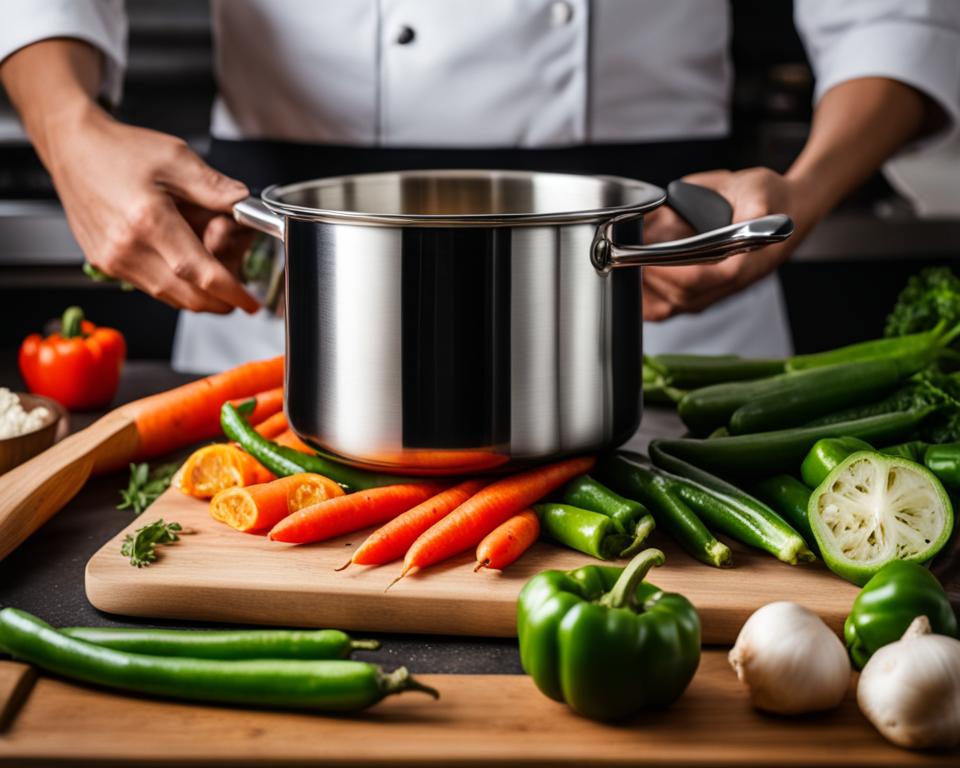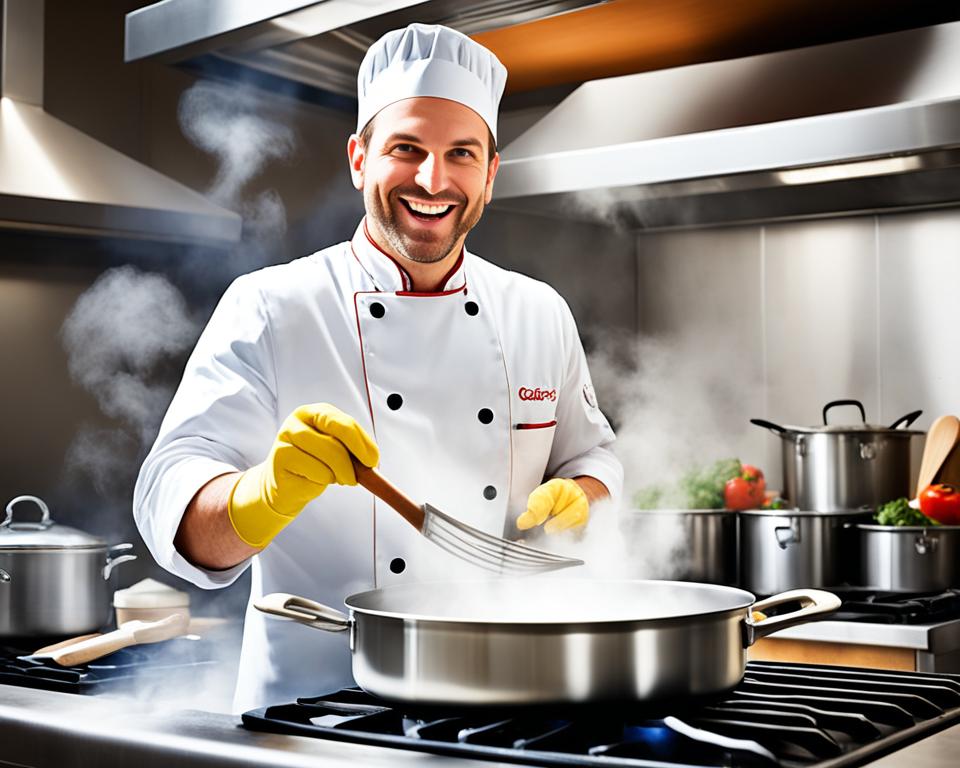Introduction
Specialty cookware is cookware that is specifically designed for a particular type of cooking. For example, there are specialty cookware sets for making paella, wok cooking, or deep frying. Specialty cookware is often made from different materials than traditional cookware, such as cast iron or stainless steel.
In this article, we will discuss the different types of specialty cookware, the benefits of using specialty cookware, how to choose the right specialty cookware, and where to buy specialty cookware. We will also provide tips on cleaning and maintaining specialty cookware, and discuss common mistakes when using specialty cookware.
Introduction
Specialty cookware is cookware that is specifically designed for a particular type of cooking. For example, there are different types of cookware for making paella, wok cooking, deep frying, and baking. Specialty cookware is often made from different materials than traditional cookware, and it may have features that make it more suitable for a particular type of cooking.
Types of Specialty Cookware
There are many different types of specialty cookware available on the market, each designed for a specific purpose. Some of the most common types of specialty cookware include:
* **Cast iron cookware:** Cast iron is a durable material that heats evenly and retains heat well. It is ideal for searing, frying, and baking.
* **Stainless steel cookware:** Stainless steel is a corrosion-resistant material that is easy to clean. It is a good choice for all-around cooking.
* **Copper cookware:** Copper is a good conductor of heat, which makes it ideal for searing and frying. Copper cookware is also relatively lightweight.
* **Nonstick cookware:** Nonstick cookware is coated with a material that prevents food from sticking to the pan. It is a good choice for people who are looking for an easy-to-clean option.
* **Woks:** Woks are a type of pan that is designed for stir-frying. They are typically made from carbon steel or stainless steel.
* **Dutch ovens:** Dutch ovens are a type of pot that is used for braising, stewing, and other slow-cooking methods. They are typically made from cast iron or enameled cast iron.
* **Paella pans:** Paella pans are a type of shallow pan that is used for making paella. They are typically made from carbon steel or stainless steel.
* **Pizza ovens:** Pizza ovens are a type of oven that is specifically designed for baking pizza. They are typically made from brick or stone.
These are just a few of the many types of specialty cookware that are available on the market. When choosing the right specialty cookware for your needs, it is important to consider the type of cooking you will be doing and the materials that you prefer.
II. Types of Specialty Cookware
There are many different types of specialty cookware available on the market, each designed for a specific purpose. Some of the most common types of specialty cookware include:
- Woks
- Paella pans
- Dutch ovens
- Sous vide cookers
- Griddles
- Pizza stones
- Cast iron skillets
- Stainless steel cookware
- Nonstick cookware
Each type of specialty cookware has its own unique advantages and disadvantages. For example, woks are ideal for stir-frying, paella pans are perfect for making paella, and Dutch ovens are great for slow cooking. When choosing the right type of specialty cookware, it is important to consider the type of cooking you will be doing most often.
V. Cleaning and Maintaining Specialty Cookware
Specialty cookware can be more difficult to clean and maintain than regular cookware. However, by following these tips, you can keep your specialty cookware looking its best and ensure that it lasts for many years to come.
- Always read the manufacturer’s instructions for cleaning and maintaining your specialty cookware.
- Use a mild detergent and warm water to clean your specialty cookware.
- Avoid using harsh chemicals or abrasive cleaners, as these can damage the cookware.
- Do not soak your specialty cookware in water for long periods of time, as this can cause the metal to rust.
- Rinse your specialty cookware thoroughly after washing it.
- Dry your specialty cookware thoroughly before storing it.
By following these tips, you can keep your specialty cookware looking its best and ensure that it lasts for many years to come.
II. Types of Specialty Cookware
There are many different types of specialty cookware available on the market, each designed for a specific purpose. Some of the most common types of specialty cookware include:
* **Cast iron cookware:** Cast iron is a durable material that heats evenly and retains heat well. It is ideal for searing, frying, and baking.
* **Stainless steel cookware:** Stainless steel is a versatile material that can be used for a variety of cooking methods. It is easy to clean and maintain.
* **Ceramic cookware:** Ceramic cookware is non-stick and heat resistant. It is ideal for making delicate dishes that require a gentle heat.
* **Nonstick cookware:** Nonstick cookware is coated with a Teflon-like material that prevents food from sticking to the pan. It is ideal for quick and easy cooking.
* **Woks:** Woks are a type of pan that is designed for stir-frying. They have a large, round bottom and sloping sides.
* **Dutch ovens:** Dutch ovens are a type of pot that is used for braising, stewing, and slow cooking. They have a heavy lid that helps to retain heat.
* **Paella pans:** Paella pans are a type of shallow pan that is used for making paella. They have a wide, flat bottom and sloped sides.
* **Pizza stones:** Pizza stones are used to bake pizza in a home oven. They help to create a crispy crust.
* **Griddles:** Griddles are used to cook pancakes, eggs, bacon, and other breakfast foods.
These are just a few of the many different types of specialty cookware available. By choosing the right type of cookware for your needs, you can make your cooking experience more enjoyable and successful.
VII. Common Mistakes When Using Specialty Cookware
Here are some common mistakes people make when using specialty cookware:
* Using the wrong type of cookware for the job. For example, you should not use a nonstick pan for searing meat or a cast iron skillet for making delicate sauces.
* Not preheating the cookware properly. This can cause food to stick and burn.
* Overcooking food. Specialty cookware can often cook food quickly, so it’s important to watch your food carefully and not overcook it.
* Using too much heat. Specialty cookware can withstand high heat, but it’s important to use the right amount of heat for the job.
* Not cleaning and maintaining the cookware properly. Specialty cookware can be difficult to clean, so it’s important to follow the manufacturer’s instructions for cleaning and maintenance.
By avoiding these common mistakes, you can help to ensure that you get the most out of your specialty cookware and cook delicious, healthy meals.
Safety Tips for Using Specialty Cookware
VIII. Safety Tips for Using Specialty Cookware
When using specialty cookware, it is important to take precautions to avoid accidents. Here are some safety tips:
- Always read the manufacturer’s instructions carefully before using any specialty cookware.
- Be aware of the maximum temperature that the cookware can withstand.
- Never use specialty cookware on a hotplate or other heat source that is not specifically designed for that type of cookware.
- Never leave specialty cookware unattended on a heat source.
- Use potholders or oven mitts to protect your hands when handling hot specialty cookware.
- Never put specialty cookware in the dishwasher.
- Clean specialty cookware according to the manufacturer’s instructions.
By following these safety tips, you can help to prevent accidents and keep yourself safe while using specialty cookware.
FAQs About Specialty Cookware
Here are some common questions about specialty cookware, along with answers to help you make the most of your kitchenware.
Q: What is the difference between specialty cookware and regular cookware?
Specialty cookware is designed for a specific type of cooking, while regular cookware can be used for a variety of tasks. For example, a wok is a type of specialty cookware that is ideal for stir-frying, while a Dutch oven is a type of regular cookware that can be used for braising, stewing, and baking.
Q: What are the benefits of using specialty cookware?
There are a number of benefits to using specialty cookware, including:
- It can help you cook food more evenly and efficiently.
- It can help you create dishes with a more consistent flavor.
- It can help you save time and energy in the kitchen.
Q: How do I choose the right specialty cookware?
When choosing specialty cookware, there are a few things you should keep in mind, including:
- The type of cooking you will be doing.
- The size of your kitchen.
- Your budget.
Q: Where can I buy specialty cookware?
Specialty cookware is available at a variety of stores, including kitchenware stores, department stores, and online retailers.
Q: How do I clean and maintain specialty cookware?
The best way to clean and maintain specialty cookware depends on the type of material it is made from. For example, cast iron cookware should be cleaned with warm water and a mild soap, while stainless steel cookware can be cleaned with a more abrasive cleaner.
Q: What are some common mistakes when using specialty cookware?
There are a few common mistakes that people make when using specialty cookware, including:
- Using the wrong type of cookware for the job.
- Not cleaning the cookware properly.
- Overheating the cookware.
Q: What are some safety tips for using specialty cookware?
Here are a few safety tips for using specialty cookware:
- Always read the manufacturer’s instructions before using specialty cookware.
- Use oven mitts or potholders when handling hot cookware.
- Never leave hot cookware unattended on the stovetop.
Q: What are some common FAQs about specialty cookware?
Here are some common FAQs about specialty cookware:
- What is the difference between specialty cookware and regular cookware?
- What are the benefits of using specialty cookware?
- How do I choose the right specialty cookware?
- Where can I buy specialty cookware?
- How do I clean and maintain specialty cookware?
- What are some common mistakes when using specialty cookware?
- What are some safety tips for using specialty cookware?


